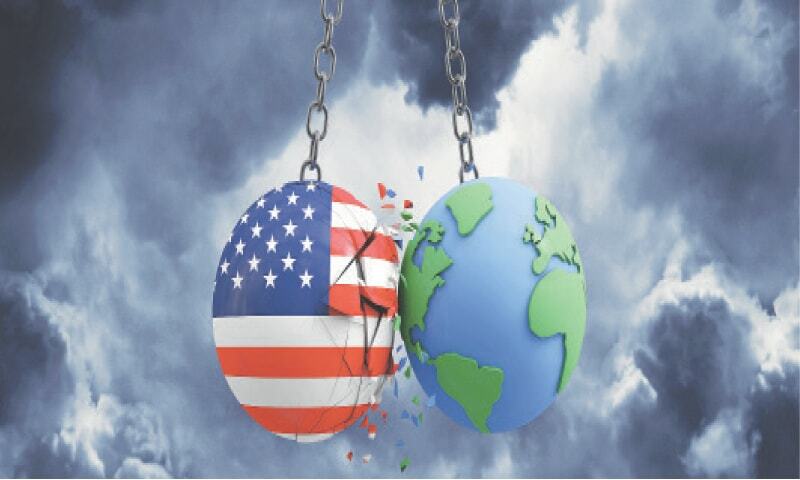The US tariffs have upended the global economic order in just weeks. Though the violent market reaction forced the hand of President Donald Trump to temporarily suspend most tariffs on all, barring China, until July to reset new terms of trade with countries facing his higher reciprocal tariffs, it has triggered a new climate of uncertainty.
With uncertainty escalating into a global trade war, the financial markets continue to roil as worries over an uncertain global business environment seem to have overtaken countries and investors more than tariffs themselves. And countries like Pakistan, which do not have much to offer Washington in exchange for a reprieve or lower tariffs, continue to wonder what sort of deal, if any, they are going to get from the US administration to maintain their market share in the world’s largest consumer market.
What does this tariff war mean for the global economy? The World Trade Organisation’s (WTO) Global Trade Outlook and Statistics report, published on April 16, warned that Trump’s tariffs would send international trade into reverse this year, depressing global economic growth. Goods trade, previously forecast to expand by 2.7 per cent this year, is now expected to decline to 2.5pc. And if Trump’s far larger tariffs are reimposed after the 90-day hiatus, it would have a much greater impact, causing a 0.8pc decline in global goods trade.
It also expects global GDP growth to weaken to 2.2pc from the previous forecast of 2.8pc. In case of a surge in “trade policy uncertainty” worldwide as other countries readjust their policies in response, the WTO believes that the impact would be an even greater 1.5pc fall in trade. And in this worst-case scenario, the WTO predicts an even weaker global GDP growth of just 1.7pc.
‘Trump’s gamble to revive manufacturing via tariffs now risks accelerating the very decline it sought to reverse, as globalisation’s unwinding leaves the US isolated, not strengthened’
WTO director general Ngozi Okonjo-Iweala said the enduring uncertainty threatens to act as a brake on global growth, with severe negative consequences for the world and its most vulnerable economies in particular. She was particularly concerned about the “decoupling” of the US and China, calling it a phenomenon that would have far-reaching consequences. Additionally, the reactivation of higher tariffs could have severe repercussions for economies like Pakistan, which are particularly sensitive to external economic shocks due to their trade concentrated on a small number of products as well as their limited resources to deal with setbacks.
Trump’s tariffs completely disregard the “most favoured nation” rule, requiring a country to extend a trade advantage offered to one member country to the others as well. China has called upon the WTO to investigate the impact of the tariffs. “Reciprocal tariffs are not — and will never be — a cure for trade imbalances. Instead, they will backfire, harming the US itself,” Beijing said.
Besides the WTO, the International Monetary Fund (IMF) and World Bank have also warned about the potential shock to trade from a tariff war. Ajay Banga, head of the World Bank, said growing uncertainty would lead to slower global growth than expected. The IMF, however, stopped short of predicting a worldwide recession, saying, “Our new growth projections will include notable markdowns, but not recession.” But it did warn about an “erosion of trust” between countries.
With a temporary reprieve in higher tariffs for the rest of the world in place, Trump has zeroed in on China. When facing US tariff bullying, many believe that the US, as the largest global consumer market, is in a dominant position, and other countries, as suppliers, must accept changes to the rules or risk being outmanoeuvred, argues Robin Xing, Chief China Economist at Morgan Stanley.
However, he says, this view is outdated. “With China’s increasing income levels, changes in development concepts, demographic shifts, and technological advancements, China could accelerate its transition to a domestic demand-driven economy, rather than merely positioning itself as a supplier,” he told an online conference organised by the China Macroeconomy Forum on April 9.
Trump’s tariff policy, he said, has left a lasting wound on the US itself — one that’s playing out in two key ways. Businesses are holding back on investment, while consumers are getting hit with higher prices. The stock market is down, pushing the economy closer to a potential recession this year.
The Morgan Stanley economist maintained that Trump’s latest tariff push represents a 30-year inflection point in global economics. Unlike past trade disputes, today’s policies have created structural scars: multinational corporations now view US policy as erratic, undermining decades of trust in America’s role as a stable anchor of globalisation.
“This permanent wound to confidence is driving capital away from the US and its allies, fracturing the post-Cold War economic order that once recycled global trade surpluses into Wall Street. Meanwhile, the US lacks tools to respond: high inflation and deficits limit Fed rate cuts, while Trump’s fiscal plans remain gridlocked.
“The stakes mirror 2008’s systemic crisis — but unlike then, America enters this battle weakened, its policy credibility shattered and economic tools depleted. Trump’s gamble to revive manufacturing via tariffs now risks accelerating the very decline it sought to reverse, as globalisation’s unwinding leaves the US isolated, not strengthened,” Mr Xing concluded.
The world is witnessing a seismic shift, with the US now facing recession risks and China likely seizing this opportunity to open itself to exports from countries affected by Trump’s import taxes, a major Lahore-based textiles exporter said on the condition of anonymity. “These new global economic order realities present economies like Pakistan, having deep economic relations with the two economic giants, with challenges and opportunities. If the US market shuts out Pakistan, China’s movement towards a domestic demand-driven economy and opening up its market for others could make up for more than its potential US losses.”
Published in Dawn, The Business and Finance Weekly, April 21st, 2025


